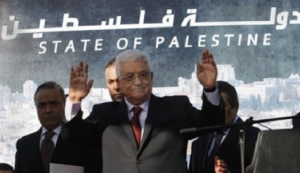
Although the Fatah run Palestinian Authority, led by autocrat Mahmoud Abbas, publicly endorses a 2-state-solution to the US, UN, EU etc., the moment a Palestinian state was to gain independence, Hamas would eradicate Fatah exactly as it did in Gaza in 2007, and ‘Abbas and Associates’ know this as a guaranteed outcome…which is why Abbas is in his 12th year of a 4 year term as president…and having never agreed to peace offers by Israel.
By Hillel Fendel
Why does the PA oppose a two-state solution? It’s simple: Without the IDF to protect it, Fatah would be swallowed up by Hamas.
In a paper written for the Begin-Sadat Center for Strategic Studies, Prof. Hillel Frisch explains that the elephant in the room regarding the supposed two-state solution is that the Arabs of Judea, Samaria and Gaza are simply unable to build a unified and united political entity.
Prof. Frisch, whose article is entitled, “The Two-State Solution: A Greater Threat to Palestinians than to Israel,” is a professor of political studies and Middle East studies at Bar Ilan University. His paper challenges the assumption that two states would be in the Palestinians’ interest. Frisch explains that the world refuses to acknowledge that the two-state solution has already actually failed them.
The Palestinian Authority, established in 1994, gradually received control over all of what is known as Area A – the major cities in Judea and Samaria and their environs – and was then given all of Gaza in 2005 when Israel unilaterally destroyed its communities there and withdrew its forces.
RELATED:
- Abbas is worried the ‘Arab Quartet’ plans of peace with Israel may succeed
- Did the EU’s ‘lost’ €2 Billion aid money ‘fall close to the tree’?
- Dahlan: Mahmoud Abbas pursuing peace negotiations with Israel for personal financial gain
However, writes Frisch, “that unified Palestinian entity, which was supposed to be the Palestinian side of the two-state equation, proved extremely short-lived” – and, it may be added, essentially unworkable. “Within two years of Israel’s withdrawal from Gaza, Hamas took over Gaza completely. In the summer of 2007, after several rounds of [violent hostilities with Fatah], the Islamist group established its own exclusive government in Gaza.”Thus, there were now two Palestinian entities – and “almost unnoticed, the two-state solution had given way to a three-state solution.”
Can’t the two Palestinian Arab entities simply focus on their commonality, bury the hatchet, and make peace – somewhat like the different Jewish factions did in 1948 – rendering the two-state solution viable? The short answer is: No. Although the decade-long civil war between Fatah and Hamas has been relatively bloodless, Prof. Frisch feels this would change drastically were the two to try to reunite. “The Palestinians themselves realize this,” he says, “which explains the succession of failed attempts to bring the sides together.”
Though Frisch presents his thesis as a symmetrical one, in which both Fatah and Hamas prefer their own independence as opposed to a united Palestinian entity, Fatah’s need appears to be more compelling. Basically, the status quo is essential for the security of Fatah/PA. This is because the anti-Fatah network of activists and terrorists in the PA is huge – “so substantial that the PA is able to contain it only with significant help from the IDF. For the PA, civil war might lead to the same outcome in Ramallah that it experienced in Gaza in 2007,” namely, defeat.
Frisch also notes that while Hamas appears to know how to govern and maintain unity, “Abbas’s PA and Fatah… have excelled in their divisiveness. This problem is made only graver by Abbas’s refusal to appoint a deputy and potential successor. In this state of affairs, civil war could give way to several more unresolved and bloody Palestinian partitions.”
Frisch concludes that the status quo – including Israeli settlement construction – is the best the PA can hope for: “At the end of the day, there are only two available options: 1) A Swiss cheese configuration that remains bloodless due to Israeli state expansion through settlement, which keeps the Palestinian opposing sides at bay; or 2) a prolonged and bloody Palestinian civil war between two or more Palestinian entities.”
View original Arutz Sheva publication at:
http://www.israelnationalnews.com/News/News.aspx/224105
Israel and Stuff postscript:
Whereas Prof. Hillel Frisch’s explanation is sound, and is definitely accurate, I personally feel there is another explanation why Abbas has refused past peace offers, sabotaged past negotiations, and places unrealistic preconditions to undergo future peace-talks.
…and I think it’s a much more common reason:








 Israeli New Shekel Exchange Rate
Israeli New Shekel Exchange Rate